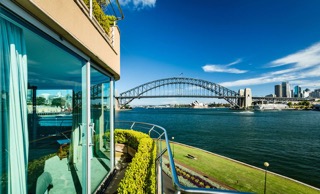The Australian property market offers a plethora of opportunities to investors. Australia itself is synonymous with stability, rich employment opportunities, world leading healthcare, efficient public transport, stunning landscapes, and iconic infrastructure. Investing in property in Australia is considered a relatively safe investment with steady capital gains and ultimately, returns.

The Australian property market offers a plethora of opportunities to investors. Australia itself is synonymous with stability, rich employment opportunities, world leading healthcare, efficient public transport, stunning landscapes, and iconic infrastructure. Investing in property in Australia is considered a relatively safe investment with steady capital gains and ultimately, returns.
The Australian government is committed to economic growth and encourages foreign investment into real estate as a way of strengthening local economy. In 2014-2015, 36841 property investment applications were approved. Australia sees investors mainly from the USA, UK, Canada, China and Japan. The majority of investors are from China.
All foreigners looking to purchase property in Australia should consult the Foreign Investment Review Board (FIRB) for specific conditions of purchase pertaining to each individual case. However, we will explain the general essence of FIRB regulations.
Are there any restrictions on foreigners purchasing real estate in Australia?
Yes. Foreigners are not eligible to purchase all types of property. You cannot purchase a pre-established residential home either personally, or through a trust or company.
The only type of residential property a foreigner is permitted to purchase is a new home. This includes off the plan property, house and land packages, and newly completed property. The term “new property” means a dwelling, which has never been occupied; or only occupied for a maximum of 12 months.
Pre-established homes that have been extensively renovated are not considered new dwellings, however, a residential property that was developed from a commercial dwelling, may be.
Foreigners may be eligible to purchase vacant land, but there are conditions around developing this land, which is that it must be completed within four years of FIRB approval.
Off the plan properties
Off the plan properties actually have many advantages. This is not limited to stamp duty savings, as well as tax deductions. The depreciation in new homes helps to claim the maximum amount of depreciation in the first year. Other taxable costs include property management fees, maintenance costs and interest on your mortgage.
However, off the plan properties have costs too. Firstly, you will need to have a deposit of at least 10%. Secondly, you will need to apply for FIRB approval, which has a fee associated. Below is a guide of FIRB fees
- For a property $1,000,000 or less: $5,000
- For all properties over $1,000,000: $10,000 per $1,000,000
It is important to note that fees are usually not waived if you have been unsuccessful at purchasing the property you have applied for, nor if you back out of the deal.
Tax-deductible costs
As a foreign investor, there are a few other costs associated with property investment in Australia. Note that these costs are also tax deductible
- Water: The landlord is usually responsible for water costs, but the bills may be passed onto the tenants if the water consumption is higher than normal.
- Council rates: Council rates are a yearly cost which goes towards maintenance in the community such as developing or repairing roads, and garbage collection.
- Strata: Strata costs increase with the amenities you add to the property, such as swimming pools, and gyms. If you want to keep costs down, lower the amount of amenities.
- Maintenance: If you’ve purchased a new property, the maintenance costs should be low as the buildings are new. However, you are responsible for maintenance and repair costs.
Good Property Managers
When leasing an investment property, it is advisable that you consult the professional services of a Property Manager. A Property Manager will find and interview suitable tenants, conduct inspections of the property, collect rent, manage any maintenance or repairs issues, and deal with any arrears.
Stamp duty
Stamp duty is applicable to all property purchased. The price of stamp duty varies based on the value of the property, and the area that it has been purchased in. Each State and Territory has different laws around stamp duty costs. But in general, it will cost tens of thousands of dollars.
Do any penalties apply if rules have been broken?
Yes. Heavy fines, and possible imprisonment are some of the likely outcomes if the FIRBs rules have been broken. Some possible fine outcomes include:
- 25% of the property purchase price; or
- 25% of the market value of the dwellings; or
- The total sum of capital gains
The government usually chooses the fine which is the greatest sum of the above. To avoid these penalties, it is always recommended you check with the FIRB regulations prior to moving ahead with a purchase.
Some other things to consider
- Currently, Australia has an incredibly low interest rate of 1.75 per cent. This makes investing in property even more attractive. However, you should always allow for room in your finances should interest rates increase.
- Fluctuating exchange rates will impact the returns you receive in your own currency.
- Banks have stricter requirements for foreign investors. This means you may be required to front up a deposit of 20-30 per cent.
For more assistance on buying in Australia, please contact Wise Real Estate Advice, Australia’s best buyers agents.



